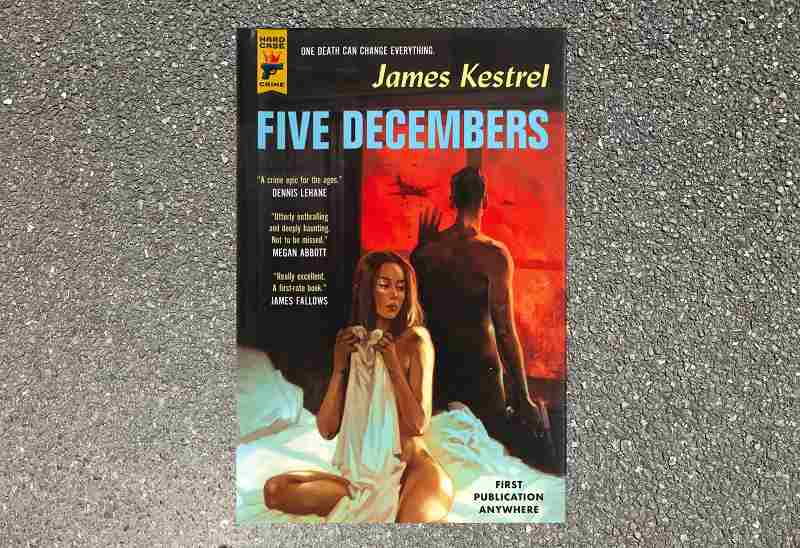
“Five Decembers” by James Kestrel, Hard Case Crime, 429 pages, $22.99
11:50 JST, June 16, 2022
A guy walks into a bar. No sooner is he served his first after-work whiskey than the phone rings, calling him back to the office. He’s a police detective. There’s been a murder. So much for a second drink.
It’s a classic, almost cliched, opening for a hard-boiled mystery. But there is nothing cliched about the rest of James Kestrel’s novel “Five Decembers,” though it retains its classic tone all the way through.
Joe McGrady is the detective, working for the Honolulu Police Department in November of 1941. When the victim of a gruesome murder is found in a shack on a Hawaiian dairy farm, McGrady is assigned to work the case with a more senior detective named Fred Ball. McGrady first meets Ball as the latter is wrapping up an unrelated investigation into an incident at a liquor store:
“He found him in a basement interrogation room. The perp was gone. Back in a holding cell, nursing his wounds. Fred Ball was sitting alone at the wooden table. A single overhead bulb cast a cone of light around him. He had a glass of ice water. He’d dipped his handkerchief in it, and wrapped the wet cloth around the knuckles of his left hand. The story around the station was that Ball had gotten meaner after his wife took off.
“He was writing on a mostly blank piece of paper. It was already signed on the bottom. On the top it said: Confession.”
That passage, and many others like it, could form a master class in how to paint a vivid scene with short, clipped sentences.
But McGrady isn’t like Ball. He can fight and kill if he must — and it spoils nothing to say that sometimes he does — but he prefers to get information through cleverness and compassion rather than beatings and bribery. He’s the type of whom Raymond Chandler wrote, “Down these mean streets a man must go who is not himself mean, who is neither tarnished nor afraid.” You can’t help rooting for the guy.
The likeliest suspect in the murder case manages to leave the Pacific islands aboard the Pan Am Clipper, a commercial seaplane that resembles a flying hotel. His apparent destination is Hong Kong. McGrady flies off in pursuit, landing in the British-run Chinese city on the afternoon of Dec. 7, 1941, local time.
You can guess part of what happens next. But what happens after that and after that and after that is often surprising.
Eventually, McGrady will make his way home to Hawaii — where many things have changed. Eventually, he will resume his investigation of the murder — with the trail gone cold. But first he has long years of war and captivity to survive.
McGrady makes it through partly by clinging to memories of the woman he loves, and partly by embracing a hard-boiled philosophy: “He had control over exactly nothing. He could watch, or he could close his eyes. Those were the only choices. And if he closed his eyes, it would all happen anyway.”
Don’t close your eyes for “Five Decembers.” It packs a wallop.
Top Articles in Culture
-

BTS to Hold Comeback Concert in Seoul on March 21; Popular Boy Band Releases New Album to Signal Return
-

Lifestyle at Kyoto Traditional Machiya Townhouse to Be Showcased in Documentary
-

‘Jujutsu Kaisen’ Voice Actor Junya Enoki Discusses Rapid Action Scenes in Season 3, Airing Now
-

Tokyo Exhibition Offers Inside Look at Impressionism; 70 of 100 Works on ‘Interiors’ by Monet, Others on Loan from Paris
-

Japanese Film ‘Kokuho’ Receives Oscar Nod in Makeup, Hairstyling Category; Makeup Artist Kazu Hiro Also Nominated
JN ACCESS RANKING
-

Japan Institute to Use Domestic Commercial Optical Lattice Clock to Set Japan Standard Time
-

Israeli Ambassador to Japan Speaks about Japan’s Role in the Reconstruction of Gaza
-

Man Infected with Measles May Have Come in Contact with Many People in Tokyo, Went to Store, Restaurant Around When Symptoms Emerged
-

Prudential Life Insurance Plans to Fully Compensate for Damages Caused by Fraudulent Actions Without Waiting for Third-Party Committee Review
-

Woman with Measles Visited Hospital in Tokyo Multiple Times Before Being Diagnosed with Disease


























